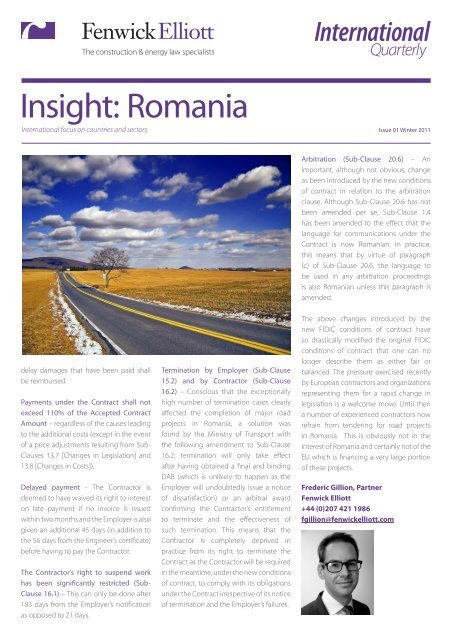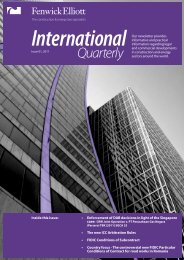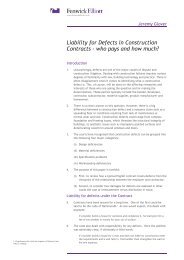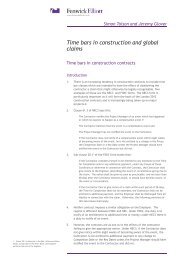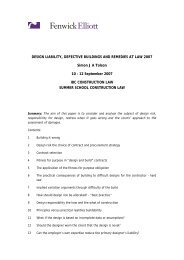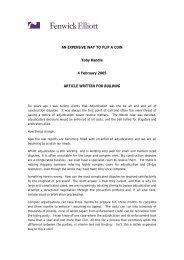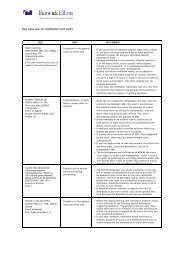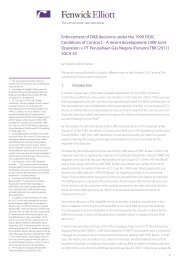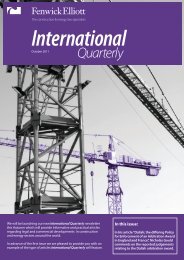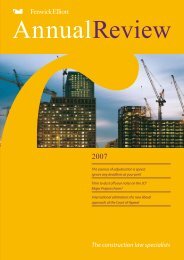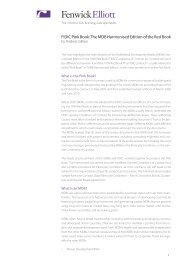CRW Joint Operation v. PT Perusahaan Gas Negara - Fenwick Elliott
CRW Joint Operation v. PT Perusahaan Gas Negara - Fenwick Elliott
CRW Joint Operation v. PT Perusahaan Gas Negara - Fenwick Elliott
You also want an ePaper? Increase the reach of your titles
YUMPU automatically turns print PDFs into web optimized ePapers that Google loves.
Insight: Romania<br />
International focus on countries and sectors Issue 01 Winter 2011<br />
Arbitration (Sub-Clause 20.6) – An<br />
important, although not obvious, change<br />
as been introduced by the new conditions<br />
of contract in relation to the arbitration<br />
clause. Although Sub-Clause 20.6 has not<br />
been amended per se, Sub-Clause 1.4<br />
has been amended to the effect that the<br />
language for communications under the<br />
Contract is now Romanian. In practice,<br />
this means that by virtue of paragraph<br />
(c) of Sub-Clause 20.6, the language to<br />
be used in any arbitration proceedings<br />
is also Romanian unless this paragraph is<br />
amended.<br />
delay damages that have been paid shall<br />
be reimbursed.<br />
Payments under the Contract shall not<br />
exceed 110% of the Accepted Contract<br />
Amount – regardless of the causes leading<br />
to the additional costs (except in the event<br />
of a price adjustments resulting from Sub-<br />
Clauses 13.7 [Changes in Legislation] and<br />
13.8 [Changes in Costs]).<br />
Delayed payment - The Contractor is<br />
deemed to have waived its right to interest<br />
on late payment if no invoice is issued<br />
within two months and the Employer is also<br />
given an additional 45 days (in addition to<br />
the 56 days from the Engineer’s certificate)<br />
before having to pay the Contractor.<br />
The Contractor’s right to suspend work<br />
has been significantly restricted (Sub-<br />
Clause 16.1) – This can only be done after<br />
183 days from the Employer’s notification<br />
as opposed to 21 days.<br />
Termination by Employer (Sub-Clause<br />
15.2) and by Contractor (Sub-Clause<br />
16.2) – Conscious that the exceptionally<br />
high number of termination cases clearly<br />
affected the completion of major road<br />
projects in Romania, a solution was<br />
found by the Ministry of Transport with<br />
the following amendment to Sub-Clause<br />
16.2: termination will only take effect<br />
after having obtained a final and binding<br />
DAB (which is unlikely to happen as the<br />
Employer will undoubtedly issue a notice<br />
of dissatisfaction) or an arbitral award<br />
confirming the Contractor’s entitlement<br />
to terminate and the effectiveness of<br />
such termination. This means that the<br />
Contractor is completely deprived in<br />
practice from its right to terminate the<br />
Contract as the Contractor will be required<br />
in the meantime, under the new conditions<br />
of contract, to comply with its obligations<br />
under the Contract irrespective of its notice<br />
of termination and the Employer’s failures.<br />
The above changes introduced by the<br />
new FIDIC conditions of contract have<br />
so drastically modified the original FIDIC<br />
conditions of contract that one can no<br />
longer describe them as either fair or<br />
balanced. The pressure exercised recently<br />
by European contractors and organizations<br />
representing them for a rapid change in<br />
legislation is a welcome move. Until then<br />
a number of experienced contractors now<br />
refrain from tendering for road projects<br />
in Romania. This is obviously not in the<br />
interest of Romania and certainly not of the<br />
EU which is financing a very large portion<br />
of these projects.<br />
Frederic Gillion, Partner<br />
<strong>Fenwick</strong> <strong>Elliott</strong><br />
+44 (0)207 421 1986<br />
fgillion@fenwickelliott.com


